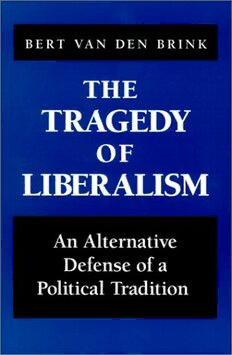
The Tragedy of Liberalism: An Alternative Defense of a Political Tradition PDF
Preview The Tragedy of Liberalism: An Alternative Defense of a Political Tradition
Page i The Tragedy of Liberalism Page ii SUNY series in Social and Political Thought Kenneth Baynes, editor Page iii The Tragedy of Liberalism An Alternative Defense of a Political Tradition Bert van den Brink Page iv Published by State University of New York Press, Albany © 2000 State University of New York All rights reserved Printed in the United States of America No part of this book may be used or reproduced in any manner whatsoever without written permission. No part of this book may be stored in a retrieval system or transmitted in any form or by any means including electronic, electrostatic, magnetic tape, mechanical, photocopying, recording, or otherwise without the prior permission in writing of the publisher. For information, address State University of New York Press, State University Plaza, Albany, N.Y., 12246 Production by Diane Ganeles Marketing by Anne Valentine Library of Congress CataloginginPublication Data Brink, Bert van den. The tragedy of liberalism : an alternative defense of a political tradition / Bert van den Brink. p. cm. — (SUNY series in social and political thought) Includes bibliographical references and index. ISBN 0791446697 (hc : acidfree). — ISBN 0791446700 (pb : acidfree) 1. Liberalism. I. Title. II. Series. JC574.B75 2000 320.51'3—dc21 99055786 10 9 8 7 6 5 4 3 2 1 Page v To my parents, my sisters, and my brother Page vii CONTENTS Preface 1 Part 1: Liberalism, Pluralism, and Tragedy 5 Introduction 5 Chapter 1. Liberalism and Moral Pluralism 9 Liberalism 9 Pluralism and How (Not) to Defend Liberalism 15 Chapter 2. The Tragedy of Liberalism 27 Two Views of Tragic Liberalism 28 A Working Hypothesis 32 Part 2: Political Liberalism Versus Liberal Perfectionism 39 Introduction 39 Chapter 3. Political Liberalism: Justification Through Public Reason 41 John Rawls: Political Liberalism 42 The TwoStage Path to an Overlapping Consensus: A Critique 49 Page viii Chapter 4. Liberal Perfectionism: Autonomy and Pluralism 63 Joseph Raz: Liberal Perfectionism 63 The Limits of Perfectionism 69 Rephrasing Some Key Concepts of Liberal Thought 75 Conclusions to Part 2 79 Part 3: Deliberative Democracy as a Way Out? 85 Introduction 85 Chapter 5. Discourse Theory and Moral Character 87 Preliminary Remarks on Deliberative Democracy 88 Jürgen Habermas: Theoretical Foundations of Public Deliberation 90 Discourse Ethics and the Limits of Formalism and Proceduralism 95 Discourse Ethics, Moral Character, and Pluralism 101 Chapter 6. Law, Democracy, and Deliberation 107 Law and Deliberative Democracy 108 The Limits of Deliberative Democracy 113 Another Revision of Key Concepts of Liberal Thought 119 Conclusions to Part 3 123 Part 4: Liberal Community, Mutual Recognition, and Citizenship 127 Virtue Introduction 127 Chapter 7. Liberal Community and the Normative Potential of Tragic 129 Conflicts Christoph Menke's Typology of Tragic Conflicts 129 Toward an Understanding of Liberal Community 135 Page ix Chapter 8. Struggles for Recognition and Tragic Conflicts 145 Axel Honneth's Theory of Recognition 146 Struggles for Recognition and the Tragedy of Liberalism 151 Chapter 9. Vulnerability and Responsibilities of Liberal Citizenship 163 Vulnerability and Responsibility 163 Virtues of Liberal Citizenship 171 Conclusions to Part 4 175 Part 5: Liberalism and Multiculturalism 181 Introduction 181 Chapter 10. Multiculturalism and Cultural Authenticity 185 How (Not) to Talk About Multiculturalism 186 A LiberalCommunitarian Perspective: Charles Taylor 192 Chapter 11. Two Liberal Views of Multiculturalism 203 Jeremy Waldron's Cosmopolitan Alternative 204 Will Kymlicka's "GroupDifferentiated Rights" Approach 211 Conclusions to Part 5 219 Notes 225 References 253 Index 261 Page 1 PREFACE This book is about what I call liberalism's tragic predicament—when the universalist and egalitarian doctrine of liberalism cannot make sense of its own ideals without articulating a normative framework that lets some conceptions of a valuable and good life appear to be more valid than others. In itself, this may seem to be an unavoidable consequence for any normative political theory. However, many leading liberal theorists overlook or even deny the fact that liberal ideals and practices can result in the morally problematic exclusion of, for instance, traditionalist and religious worldviews and social practices that seem to be of genuine value to some people. It should be possible to show that liberalism's tragic predicament is both undeniable and of fundamental importance for an understanding of the limits and scope of liberal ideals under everchanging social and cultural conditions. I argue that only those theories that recognize the fact that liberalism is a party to sometimes irreconcilable conflicts—over, for instance, public justice, cultural authenticity, and the definition of a good life—will arrive at an account of liberalism that may be expected to appeal to members of contemporary pluralist societies. This book is an attempt both to develop a systematic thesis concerning the normative core and developmental potential of liberal ideals and to come to terms with the many schools that exist within contemporary liberaldemocratic thought. As a consequence, it can be read at two levels. First, as an investigative journey through some of the most important strands of contemporary American and European political philosophy, which include John Rawls's political
